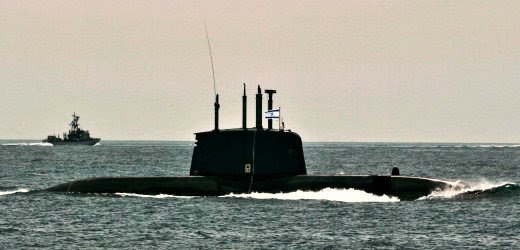Haq's Musings: Israel and Pakistan Bolster Second Strike Capability With AIP Subs
Israel does not trust Iran just as Pakistan does not trust India. While Israel is preparing for eventual nuclear-armed Iran in the future, Pakistan is threatened by India's growing nuclear triad and atomic arsenal today. So what are Israel and Pakistan doing to deter potential nuclear attacks by their regional rivals? They are both building sea-based nuclear
second strike capability with diesel-electric submarines equipped with air-independent propulsion (AIP).
Israel's Submarine Fleet:
Israel has just taken
delivery of the 5th of 6 Dolphin II class AIP-equipped submarines built by Germany. More than 225 feet long, the diesel-electric Dolphin II class is part attack submarine, part nuclear strike ship and part commando taxi. Each sub has 10 tubes. Four of these tubes are larger 26-inch tubes—the size is rare for a Western-built submarine—capable of launching small commando teams or firing larger nuclear-capable cruise missiles. The remaining six tubes measure at 21 inches, according to
Real Clear Defense.

Several German defense ministry officials interviewed by
German news magazine Der Spiegel believe that Israel intends for these submarines to carry nuclear weapons. The missiles can also be launched “using a previously secret hydraulic ejection system,” the magazine reported.
Diesel-Electric AIP Vs Nuclear-Powered Subs:
A key requirement for submarines is to be stealthy—and the Dolphin II is indeed very quiet. The trick is in the submarine’s air-independent propulsion fuel cells, which provide power under the surface as the diesel engines—used for running on the surface—rest and recharge. This system is quieter than the nuclear-powered engines on American and Russian submarines, which must constantly circulate engine coolant. Nuclear submarines are virtually unlimited in terms of range, and are better used for deep-water operations. But Israel has no need for nuclear-powered subs when quiet diesel subs can do the same job, according to Real Clear Defense.
Pakistan's AIP Submarine Fleet:
The details of Pakistan's
planned submarine fleet are not clear yet. However, Pakistan too is acquiring a fleet of AIP-equipped diesel-electric submarines.
Pakistan Navy operates a fleet of five diesel-electric submarines and three MG110 miniature submarines (SSI). The nucleus of the fleet includes two Agosta-70 and three modern Agosta-90B submarines. Pakistan's third Agosta-90B, the S 139 Hamza, was constructed indigenously and features the DCNS MESMA (Module d'EnergieSous-Marin Autonome) air-independent propulsion (AIP) system. Pakistan retrofitted the two earlier Agosta-90B vessels with the MESMA AIP propulsion system when they underwent overhaul in 2011, according to
Nuclear Threat Initiative.
Pakistan is expanding and modernizing its underwater fleet with 8 additional AIP-equipped submarines ordered from China. Whether the Chinese submarines are the S-20 export derivative of the Type-039A/Type-041 Yuan-class submarine, or a bespoke design, is unclear. But the Yuan has also been mentioned, and according to government officials. If the deal transpires, it will be the largest ever Sino-Pakistani deal. He believes the submarines will each cost $ 250 million to $325 million.
Mansoor Ahmed of Quaid-e-Azam University's Department of Defense and Strategic Studies told
Defense News that AIP-equipped conventional submarines "provide reliable second strike platforms, [and] an assured capability resides with [nuclear-powered attack and nuclear-powered ballistic missile submarines], which are technically very complex and challenging to construct and operate compared to SSKs, and also very capital intensive."
Balance of Terror as Deterrence:
Let's hope that nuclear deterrence works and the world never again sees the use of the growing stockpile of nukes in South Asia, the Middle East or anywhere else. Here's the full video of a recent interview with Pakistan's General Khalid Kidawi on Pakistan 2nd strike capability:
I think senior American analyst and South Asia watcher Stephen Cohen summed up the current situation in South Asia when he said: "The alphabet agencies—ISI, RAW, and so forth—are often the chosen instrument of state policy when there is a conventional (and now a nuclear) balance of power, and the diplomatic route seems barren."
I see little likelihood of full-scale war between India and Pakistan. The best way for the two nuclear armed neighbors to proceed is sustained diplomatic engagement to resolve all outstanding issues including Kashmir. If the diplomatic rote remains barren, there will be continuation of
covert and proxy wars in the region.
Related Links:
Haq's Musings
Pakistan's Second Strike Capability
Pakistan's Shaheen 3 Can Hit Deep Inside India and Israel
Pakistan Building Nuclear Submarine?
India's Israel Envy
Pakistan Space Program
Revolution in Military Affairs
Pakistan Defense Production Goes High-Tech
Drones Outrage and Inspire Pakistanis
RMA Status in Pakistan
Cyber Wars in South Asia
Pakistan's Biggest Ever Arms Bazar
Genomics and Biotech Advances in Pakistan
India's Israel Envy: What if Modi Attacks Pakistan
Eating Grass: Pakistan's Nuclear Program
Kerry Challenges Modi With Hard Evidence
Haq's Musings: Israel and Pakistan Bolster Second Strike Capability With AIP Subs












